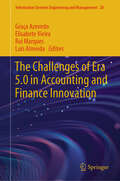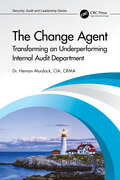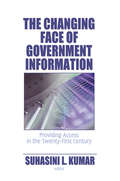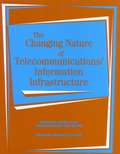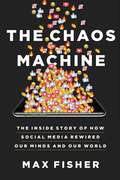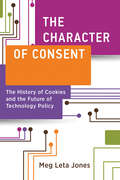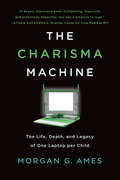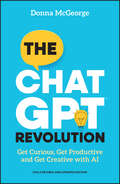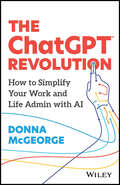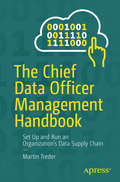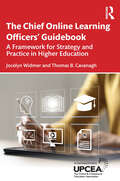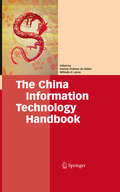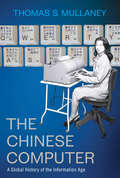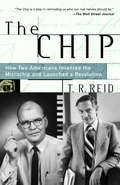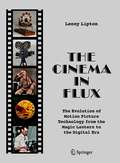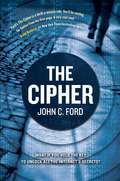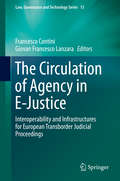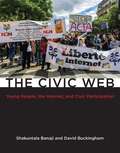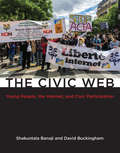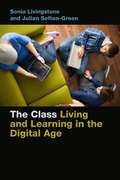- Table View
- List View
The Challenges of Era 5.0 in Accounting and Finance Innovation (Information Systems Engineering and Management #28)
by Graça Azevedo Elisabete Vieira Rui Marques Luís AlmeidaThis book seeks to explore the transformative impact of emerging technologies on the accounting and finance sectors, with a specific focus on how innovations such as artificial intelligence and digital currencies can align with human-centric values like sustainability, corporate responsibility, and ethical governance. It provides a comprehensive analysis of the challenges and opportunities presented by ‘Era 5.0,’ where technological advancements are coupled with societal progress. Featuring cutting-edge research from leading scholars and industry experts, the collection spans a wide array of topics. Readers will find detailed studies on sustainability reporting, corporate governance, and the role of AI in financial processes, alongside examinations of cross-border tax evasion, the integration of education for sustainable development, and the use of geospatial analysis in business decisions. Other key areas of focus include the Common Reporting Standard (CRS), financial inclusion, and the interplay between human capital and corporate performance. This book serves as an essential resource for academics, practitioners, and policymakers aiming to understand the rapidly evolving dynamics of accounting and finance in a technologically advanced and socially responsible world. Whether reader's interest lies in innovative financial technologies or the ethical dimensions of corporate behavior, this book provides the insights needed to navigate the future of the field.”
The Change Agent: Transforming an Underperforming Internal Audit Department (Security, Audit and Leadership Series)
by Hernan MurdockJohn Taylor has been hired to transform the underperforming internal audit unit at InSports. The auditors are not reviewing what the audit committee and executive leadership consider essential for the organization’s success, their methodology is subpar, and their relationships with their clients are strained. The audit committee has been patient, but not anymore. Their mandate is clear: make clear improvements in one year or the function will be outsourced. This is the story of a visionary leader who needs a strategy to transform processes and deliver better results for stakeholders at all levels within the organization. The audit committee, all levels of management, and employees expect more from internal audit. Now, John must lead the group through 12 challenging months as they focus on what matters most when performing audit and advisory services. They must communicate results faster and better, leverage existing quality control and data analytics techniques, and, with every encounter, help the organization address strategic, operational, compliance, and financial risks. With similarities to "The Goal" and "The Phoenix Project" and leveraging Kotter’s 8-Step Process for Leading Change, follow John and the internal audit team from Boston to New York, San Francisco, London, and Buenos Aires, as they address almost insurmountable challenges in their transformation journey.
The Changing Face of Government Information: Providing Access in the Twenty-First Century
by Suhasini L. KumarLearn what innovative changes lie in the future of government informationThe Changing Face of Government Information comprehensively examines the way government documents&’ librarians acquire, provide access, and provide reference services in the new electronic environment. Noted experts discuss the impact electronic materials have had on the Government Printing Office (GPO), the reference services within the Federal Depository Library Program (FDLP), and the new opportunities in the transition from paper-based information policy to an electronic e-government. This source reveals the latest changes in the field of government documents librarianship and the knowledge and expertise needed to teach users how to access what they need from this enormous wealth of government information.Major changes have taken place in the way government information is created, disseminated, accessed, and preserved. The Changing Face of Government Information explains in detail the tremendous change taking place in libraries and government documents librarianship. Topics include the increasing accessibility to the federally funded technical report literature, information on the Patriot Act&’s effect on the status of libraries in the aftermath of 9/11, the uses of Documents Data Miner©, and information about catalogs, indexes, and full text databases. This book also provides a selective bibliography of print and electronic sources about Native Americans and the Federal Government, as well as specific sources for information about the environment, such as EPA air data, DOE energy information, information on flora and fauna, hazardous waste, land use, and water. Each chapter is extensively referenced and several chapters use appendixes, tables, and charts to ensure understanding of data.This useful book gives readers the opportunity to learn: how the University of Oregon successfully integrated its business reference service and map collection into its government documents collection the results of a survey of FDLP institutions identifying the factors contributing to the reorganization of services details of the pilot project undertaken by the University of Arizona Library along with the United States Government Printing Office&’s Library Programs Service to create a model for a virtual depository library which critical features are missing in today&’s e-government reference service models details of the GPO&’s plans to provide perpetual access to both electronic and tangible information resources-and the strategies to authenticate government publications on the InternetThe Changing Face of Government Information is stimulating, horizon-expanding reading for librarians, professors, students, and researchers.
The Changing Landscape for Electronic Resources: Content, Access, Delivery, and Legal Issues
by Yem S Fong Suzanne M WardKeep up-to-date with the latest in innovative electronic information services! The Changing Landscape for Electronic Resources: Content, Access, Delivery, and Legal Issues focuses on the effects and challenges of providing electronic resources for libraries. The authors are librarians and other professionals with practical experience in current issues and developing trends. With this book, you will learn about technical, legal, and resource sharing developments that will contribute to the future distribution of global information in libraries. This book shows how libraries using electronic resources can reduce costs and save transaction time for large and small public libraries as well as academic libraries. It also reveals recent initiatives related to open source software and core standards for resource sharing and interlibrary loal, such as the Bath profile and the NISO Circulation Interchange Protocol (NCIP). Special features of this timely book include figures, diagrams, references, and Web sites. This book contains the wisdom and experience of professionals applying electronic resources to: interlibrary loan systems copyright and licensing open source software international data standards scholarly publishingThe Changing Landscape for Electronic Resources will help you avoid many of the potential pitfalls of managing electronic content in the evolving modern library. This book will help you prepare for a future in which electronic access improves the range, speed, and quantity of cost-effective information services for patrons and resource-sharing partners.
The Changing Nature of Telecommunications/Information Infrastructure
by Steering Committee on the Changing Nature of Telecommunications/Information InfrastructureAdvancement of telecommunications and information infrastructure occurs largely through private investment. The government affects the rate and direction of this progress through regulation and public investment. This book presents a range of positions and perspectives on those two classes of policy mechanism, providing a succinct analysis followed by papers prepared by experts in telecommunications policy and applications.
The Chaos Machine: The Inside Story of How Social Media Rewired Our Minds and Our World
by Max FisherThe Chaos Machine is an essential book for our times - Ezra KleinThe Chaos Machine is the story of how the world was driven mad by social media. The election of populists like Trump and Bolsonaro; strife and genocide in countries like Myanmar; the rampant spread of COVID-19 conspiracy theories as deadly as the pandemic itself; all of these are products of a breakdown in our social and political lives, a breakdown driven by the apps, companies and algorithms that compete constantly for our attention.Max Fisher is a leading New York Times technology reporter whose work has covered the way that social media sites - driven increasingly by artificial intelligence rather than human ingenuity - push users towards more and more extreme positions, deepening the divisions in society in pursuit of greater engagement and profit. With extraordinary access to the most powerful players in Silicon Valley, and with testimonies from around the world of the havoc being wreaked by our online selves, The Chaos Machine shows us how we got to this uniquely perilous moment - and how we might get out of it.
The Chaos Machine: The Inside Story of How Social Media Rewired Our Minds and Our World
by Max FisherHow social media is hacking our minds, our societies and the world - and what we can do about it.The Chaos Machine is the story of how the world was driven mad by social media. The election of populists like Trump and Bolsonaro; strife and genocide in countries like Myanmar; the rampant spread of COVID-19 conspiracy theories as deadly as the pandemic itself; all of these are products of a breakdown in our social and political lives, a breakdown driven by the apps, companies and algorithms that compete constantly for our attention.Max Fisher is a leading New York Times technology reporter whose work has covered the way that social media sites - driven increasingly by artificial intelligence rather than human ingenuity - push users towards more and more extreme positions, deepening the divisions in society in pursuit of greater engagement and profit. With extraordinary access to the most powerful players in Silicon Valley, and with testimonies from around the world of the havoc being wreaked by our online selves, The Chaos Machine shows us how we got to this uniquely perilous moment - and how we might get out of it.(P) 2022 Hachette Audio
The Chaos Machine: The Inside Story of How Social Media Rewired Our Minds and Our World
by Max FisherFinalist for the Helen Bernstein Book Award for Excellence in JournalismFrom a New York Times investigative reporter, this &“authoritative and devastating account of the impacts of social media&” (New York Times Book Review) tracks the high-stakes inside story of how Big Tech&’s breakneck race to drive engagement—and profits—at all costs fractured the world. The Chaos Machine is &“an essential book for our times&” (Ezra Klein). We all have a vague sense that social media is bad for our minds, for our children, and for our democracies. But the truth is that its reach and impact run far deeper than we have understood. Building on years of international reporting, Max Fisher tells the gripping and galling inside story of how Facebook, Twitter, YouTube, and other social network preyed on psychological frailties to create the algorithms that drive everyday users to extreme opinions and, increasingly, extreme actions. As Fisher demonstrates, the companies&’ founding tenets, combined with a blinkered focus on maximizing engagement, have led to a destabilized world for everyone. Traversing the planet, Fisher tracks the ubiquity of hate speech and its spillover into violence, ills that first festered in far-off locales, to their dark culmination in America during the pandemic, the 2020 election, and the Capitol Insurrection. Through it all, the social-media giants refused to intervene in any meaningful way, claiming to champion free speech when in fact what they most prized were limitless profits. The result, as Fisher shows, is a cultural shift toward a world in which people are polarized not by beliefs based on facts, but by misinformation, outrage, and fear. His narrative is about more than the villains, however. Fisher also weaves together the stories of the heroic outsiders and Silicon Valley defectors who raised the alarm and revealed what was happening behind the closed doors of Big Tech. Both panoramic and intimate, The Chaos Machine is the definitive account of the meteoric rise and troubled legacy of the tech titans, as well as a rousing and hopeful call to arrest the havoc wreaked on our minds and our world before it&’s too late.
The Character of Consent: The History of Cookies and the Future of Technology Policy (Information Policy)
by Meg Leta JonesThe rich, untold origin story of the ubiquitous web cookie—what&’s wrong with it, why it&’s being retired, and how we can do better.Consent pop-ups continually ask us to download cookies to our computers, but is this all-too-familiar form of privacy protection effective? No, Meg Leta Jones explains in The Character of Consent, rather than promote functionality, privacy, and decentralization, cookie technology has instead made the internet invasive, limited, and clunky. Good thing, then, that the cookie is set for retirement in 2024. In this eye-opening book, Jones tells the little-known story of this broken consent arrangement, tracing it back to the major transnational conflicts around digital consent over the last twenty-five years. What she finds is that the policy controversy is not, in fact, an information crisis—it&’s an identity crisis.Instead of asking how people consent, Jones asks who exactly is consenting and to what. Packed into those cookie pop-ups, she explains, are three distinct areas of law with three different characters who can consent. Within (mainly European) data protection law, the data subject consents. Within communication privacy law, the user consents. And within consumer protection law, the privacy consumer consents. These areas of law have very different histories, motivations, institutional structures, expertise, and strategies, so consent—and the characters who can consent—plays a unique role in those areas of law. The Character of Consent gives each computer character its due, taking us back to their origin stories within the legal history of computing. By doing so, Jones provides alternative ways of understanding the core issues within the consent dilemma. More importantly, she offers bold new approaches to creating and adopting better tech policies in the future.
The Charisma Machine: The Life, Death, and Legacy of One Laptop per Child (Infrastructures)
by Morgan G. AmesA fascinating examination of technological utopianism and its complicated consequences.In The Charisma Machine, Morgan Ames chronicles the life and legacy of the One Laptop per Child project and explains why—despite its failures—the same utopian visions that inspired OLPC still motivate other projects trying to use technology to “disrupt” education and development. Announced in 2005 by MIT Media Lab cofounder Nicholas Negroponte, One Laptop per Child promised to transform the lives of children across the Global South with a small, sturdy, and cheap laptop computer, powered by a hand crank. In reality, the project fell short in many ways—starting with the hand crank, which never materialized. Yet the project remained charismatic to many who were captivated by its claims of access to educational opportunities previously out of reach. Behind its promises, OLPC, like many technology projects that make similarly grand claims, had a fundamentally flawed vision of who the computer was made for and what role technology should play in learning.Drawing on fifty years of history and a seven-month study of a model OLPC project in Paraguay, Ames reveals that the laptops were not only frustrating to use, easy to break, and hard to repair, they were designed for “technically precocious boys”—idealized younger versions of the developers themselves—rather than the children who were actually using them. The Charisma Machine offers a cautionary tale about the allure of technology hype and the problems that result when utopian dreams drive technology development.
The ChatGPT Revolution: Get Curious, Get Productive and Get Creative with AI
by Donna McGeorgeLearn how to simplify your life with AI in this essential guide — now fully updated and revised, with even more ideas to spark creativity and boost efficiency The ChatGPT Revolution is the ultimate quick-start guide to unlocking the power of generative AI. We’re on the edge of an AI revolution … but what does that mean for you? It’s time to get curious about how the latest tech can help you handle your everyday load, at work and at home! Whether you’re overwhelmed by repetitive, time-consuming tasks or you’re simply looking for a fresh injection of creativity, ChatGPT has got your back. With this essential handbook, you’ll learn how quickly and easily apps like ChatGPT can turn your to-do list into a ta-da list. From emails and reports to planning your next meal or vacation, generative AI can help you simplify your daily tasks and responsibilities. The ChatGPT Revolution shows you exactly how to use this innovative tech to save on time and stress. Sharing practical tips and fun ideas, acclaimed productivity expert Donna McGeorge unpacks everything you need to know. Learn how generative AI is already being used in everyday life — and how tools like ChatGPT are transforming the future of work and life admin Understand the different tasks that AI tools like ChatGPT, Copilot, and DALL-E can do — and when and how to use these tools most effectively Get step-by-step advice for writing smart, specific prompts and follow-up queries to produce better results Discover tips for using ChatGPT on the go, with the mobile app and voice and photo capability Take control, revitalise your workflows, and overcome procrastination and creative blocks — with entertaining examples and activities for work, home, creative writing, and more Whether you’re a busy professional or you simply want an answer to the dreaded question ‘What’s for dinner?,’ The ChatGPT Revolution reveals how generative AI can make your life easier. AI technologies are here to stay. This is your invitation to join the revolution. Pick up this book and learn how to harness the power of AI, so you can free up more time and energy for the things that truly matter.
The ChatGPT Revolution: How to Simplify Your Work and Life Admin with AI
by Donna McGeorgeThe essential guide to using AI in your everyday life The ChatGPT Revolution is the ultimate quick-start guide to unlocking the power of AI tool ChatGPT. We’re on the edge of an AI revolution… but what does that mean for you? It’s time to get curious about how the latest tech can help you handle your everyday load, at work and at home! Whether you’re overwhelmed by repetitive, time-consuming tasks or you’re simply looking for a fresh injection of creativity, ChatGPT is the virtual assistant that’s got your back. With this essential handbook, you’ll learn how quickly and easily ChatGPT can turn your to-do list into a ta-da list. From helping you write emails and reports to planning your next meal or vacation, ChatGPT offers a new way to simplify your daily tasks and responsibilities. The ChatGPT Revolution shows you exactly how to use this innovative tech to save on time and stress. Sharing practical tips and fun ideas, author and acclaimed productivity expert Donna McGeorge unpacks everything you need to know. Learn how AI is already being used in everyday life — and how tools like ChatGPT are transforming the future of work and life admin Understand the different tasks ChatGPT can do and when and how to use it most effectively Get step-by-step advice for writing smart, specific prompts and follow-up queries that will produce better results Get curious and get productive, with entertaining examples, advice, and activities to take control, revitalise your workflows, and overcome procrastination and creative blocksWhether you’re a busy professional or you simply want an answer to the dreaded question ‘What’s for dinner?,’ The ChatGPT Revolution reveals how you can use ChatGPT as a tool to simplify your life. AI technologies are here to stay: this is your invitation to join the revolution. Pick up this book and learn how to harness the power of AI, so you can free up more time and energy for the things that truly matter.
The Chief Data Officer Management Handbook: Set Up and Run an Organization’s Data Supply Chain
by Martin TrederThere is no denying that the 21st century is data driven, with many digital industries relying on careful collection and analysis of mass volumes of information. A Chief Data Officer (CDO) at a company is the leader of this process, making the position an often daunting one. The Chief Data Officer Management Handbook is here to help.With this book, author Martin Treder advises CDOs on how to be better prepared for their swath of responsibilities, how to develop a more sustainable approach, and how to avoid the typical pitfalls. Based on positive and negative experiences shared by current CDOs, The Chief Data Officer Management Handbook guides you in designing the ideal structure of a data office, implementing it, and getting the right people on board.Important topics such as the data supply chain, data strategy, and data governance are thoughtfully covered by Treder. As a CDO it is important to use your position effectively with your entire team. The Chief Data Officer Management Handbook allows all employees to take ownership in data collaboration. Data is the foundation of present and future tech innovations, and you could be the leader that makes the next big impact.What You Will LearnApply important elements of effective data managementGain a comprehensive overview of all areas of data (which are often managed independently Work with the data supply chain, from data acquisition to its usage, a review of all relevant stakeholders, data strategy, and data governanceWho This Book is ForCDOs, data executives, data advisors, and all professionals looking to understand about how a data office functions in an organization.
The Chief Online Learning Officers' Guidebook: A Framework for Strategy and Practice in Higher Education
by Thomas B. Cavanagh Jocelyn WidmerThe Chief Online Learning Officers’ Guidebook explores the essential competencies required of Chief Online Learning Officers (COLOs) using insights from real-world leadership and expert perspectives from higher education. Digital and online learning have become strategic priorities for higher education institutions working toward enrollment growth, learner engagement, revenue generation, brand diversification, and enhanced student flexibility following the initial COVID-19 lockdown. This book’s unique framework substantiates and demonstrates key competencies that define the COLO role and enable advancements in the practice of online and digital higher education. Featuring over 50 contributions from COLOs, Chief Information Officers (CIOs), university presidents, and other higher education leaders, this UPCEA-endorsed guide offers practical strategies and comprehensive guidance for both current and aspiring COLOs.
The China Information Technology Handbook
by Miltiadis D. Lytras Patricia Ordóñez de PablosThis handbook is a reference for those interested in information technologies and emerging management practices in China. The emphasis on information technologies and management provides a unique proposition and gives characteristics of flexibility and adoption to diverse audiences. The subject area is a combination of global information technology and management along with strategic management of IT. The handbook exploits state-of-the-art and emerging trends in theory and technology. This handbook is primarily designed for a professional and academic audience.
The Chinese Computer: A Global History of the Information Age
by Thomas S. MullaneyThe fascinating, untold story of how the Chinese language overcame unparalleled challenges and revolutionized the world of computing.A standard QWERTY keyboard has a few dozen keys. How can Chinese—a language with tens of thousands of characters and no alphabet—be input on such a device? In The Chinese Computer, Thomas S. Mullaney sets out to resolve this paradox, and in doing so, discovers that the key to this seemingly impossible riddle has given rise to a new epoch in the history of writing—a form of writing he calls &“hypography.&” Based on fifteen years of research, this pathbreaking history of the Chinese language charts the beginnings of electronic Chinese technology in the wake of World War II up through to its many iterations in the present day.Mullaney takes the reader back through the history and evolution of Chinese language computing technology, showing the development of electronic Chinese input methods—software programs that enable Chinese characters to be produced using alphanumeric symbols—and the profound impact they have had on the way Chinese is written. Along the way, Mullaney introduces a cast of brilliant and eccentric personalities drawn from the ranks of IBM, MIT, the CIA, the Pentagon, the Taiwanese military, and the highest rungs of mainland Chinese establishment, to name a few, and the unexpected roles they played in developing Chinese language computing. Finally, he shows how China and the non-Western world—because of the hypographic technologies they had to invent in order to join the personal computing revolution—&“saved&” the Western computer from its deep biases, enabling it to achieve a meaningful presence in markets outside of the Americas and Europe.An eminently engaging and artfully told history, The Chinese Computer is a must-read for anyone interested in how culture informs computing and how computing, in turn, shapes culture.
The Chinese Typewriter: A History (The\mit Press Ser.)
by Thomas S. MullaneyHow Chinese characters triumphed over the QWERTY keyboard and laid the foundation for China's information technology successes today.Chinese writing is character based, the one major world script that is neither alphabetic nor syllabic. Through the years, the Chinese written language encountered presumed alphabetic universalism in the form of Morse Code, Braille, stenography, Linotype, punch cards, word processing, and other systems developed with the Latin alphabet in mind. This book is about those encounters—in particular thousands of Chinese characters versus the typewriter and its QWERTY keyboard. Thomas Mullaney describes a fascinating series of experiments, prototypes, failures, and successes in the century-long quest for a workable Chinese typewriter. The earliest Chinese typewriters, Mullaney tells us, were figments of popular imagination, sensational accounts of twelve-foot keyboards with 5,000 keys. One of the first Chinese typewriters actually constructed was invented by a Christian missionary, who organized characters by common usage (but promoted the less-common characters for “Jesus" to the common usage level). Later came typewriters manufactured for use in Chinese offices, and typewriting schools that turned out trained “typewriter girls” and “typewriter boys.” Still later was the “Double Pigeon” typewriter produced by the Shanghai Calculator and Typewriter Factory, the typewriter of choice under Mao. Clerks and secretaries in this era experimented with alternative ways of organizing characters on their tray beds, inventing an input method that was the first instance of “predictive text.”Today, after more than a century of resistance against the alphabetic, not only have Chinese characters prevailed, they form the linguistic substrate of the vibrant world of Chinese information technology. The Chinese Typewriter, not just an “object history” but grappling with broad questions of technological change and global communication, shows how this happened.A Study of the Weatherhead East Asian InstituteColumbia University
The Chip: How Two Americans Invented the Microchip and Launched a Revolution
by T. R. ReidBarely fifty years ago a computer was a gargantuan, vastly expensive thing that only a handful of scientists had ever seen. The world's brightest engineers were stymied in their quest to make these machines small and affordable until the solution finally came from two ingenious young Americans. Jack Kilby and Robert Noyce hit upon the stunning discovery that would make possible the silicon microchip, a work that would ultimately earn Kilby the Nobel Prize for physics in 2000. In this completely revised and updated edition of The Chip, T. R. Reid tells the gripping adventure story of their invention and of its growth into a global information industry. This is the story of how the digital age began.
The Cinema in Flux: The Evolution of Motion Picture Technology from the Magic Lantern to the Digital Era
by Lenny LiptonThe first of its kind, this book traces the evolution of motion picture technology in its entirety. Beginning with Huygens' magic lantern and ending in the current electronic era, it explains cinema’s scientific foundations and the development of parallel enabling technologies alongside the lives of the innovators. Product development issues, business and marketplace factors, the interaction of aesthetic and technological demands, and the patent system all play key roles in the tale. The topics are covered sequentially, with detailed discussion of the transition from the magic lantern to Edison’s invention of the 35mm camera, the development of the celluloid cinema, and the transition from celluloid to digital. Unique and essential reading from a lifetime innovator in the field of cinema technology, this engaging and well-illustrated book will appeal to anyone interested in the history and science of cinema, from movie buffs to academics and members of the motion picture industry.
The Cipher
by John C. Ford"Ford's The Cipher is a thrill-a-minute ride. A very cool read."--David Baldacci You think your emails are private?Your credit card number is secure?That stock trades, government secrets, and nuclear codes are safe?...th1nk aga1n.Robert "Smiles" Smylie is not a genius. He feels like he's surrounded by them, though, from his software mogul dad to his brainy girlfriend to his oddball neighbor Ben, a math prodigy. When Ben cracks an ancient, real-life riddle central to modern data encryption systems, he suddenly holds the power to unlock every electronic secret in the world--and Smiles finally has a chance to prove his own worth. Smiles hatches a plan to protect Ben from the government agents who will stop at nothing to get their hands on his discovery. But as he races from a Connecticut casino to the streets of Boston, enlisting the help of an alluring girl, Smiles comes to realize the most explosive secrets don't lie between the covers of Ben's notebook--they're buried in his own past. Eerily close to reality and full of shocking twists, this techno-thriller reveals how easily the private can become public, and just how dangerous it can be to encrypt our personal histories.
The Circulation of Agency in E-Justice
by Giovan Francesco Lanzara Francesco ContiniThis book contributes to an understanding of the dynamic complexities involved in the design of e-justice applications that enable online trans-border judicial proceedings in Europe. It provides answers to critical questions with practical relevance: How should online trans-border judicial proceedings be designed in order to deliver effective and timely justice to European citizens, businesses and public agencies? How can the circulation of judicial agency across Europe be facilitated? Based on extensive research, the book explores and assesses the complex entanglements between law and technology, and between national and European jurisdictions that emerge when developing even relatively simple e-services such as those supporting the European small claims procedure and European payment orders. In addition to providing a strong theoretical framework and an innovative approach to e-justice design, this book includes case studies that are based on a common methodology and theoretical framework. It presents original empirical material on the development of e-government systems in the area of European justice. Finally, it introduces the design strategies of Maximum Feasible Simplicity and Maximum Manageable Complexity and, based on them, it proposes architectural and procedural solutions to enhance the circulation of judicial agency.
The Civic Web: Young People, the Internet and Civic Participation
by Shakuntala Banaji David BuckinghamThere has been widespread concern in contemporary Western societies about declining engagement in civic life; people are less inclined to vote, to join political parties, to campaign for social causes, or to trust political processes. Young people in particular are frequently described as alienated or apathetic. Some have looked optimistically to new media -- and particularly the Internet -- as a means of revitalizing civic life and democracy. Governments, political parties, charities, NGOs, activists, religious and ethnic groups, and grassroots organizations have created a range of youth-oriented websites that encourage widely divergent forms of civic engagement and use varying degrees of interactivity. But are young people really apathetic and lacking in motivation? Does the Internet have the power to re-engage those disenchanted with politics and civic life? Based on a major research project funded by the European Commission, this book attempts to understand the role of the Internet in promoting young peoples participation. Examples are drawn from Hungary, the Netherlands, Slovenia, Spain, Sweden, Turkey, and the United Kingdom -- countries offering contrasting political systems and cultural contexts. The book also addresses broader questions about the meaning of civic engagement, the nature of new forms of participation, and their implications for the future of civic life.
The Civic Web: Young People, the Internet, and Civic Participation (The John D. and Catherine T. MacArthur Foundation Series on Digital Media and Learning)
by Shakuntala Banaji David BuckinghamAn investigation of how governments, organizations, and groups use the Internet to promote civic and political engagement among young people.There has been widespread concern in contemporary Western societies about declining engagement in civic life; people are less inclined to vote, to join political parties, to campaign for social causes, or to trust political processes. Young people in particular are frequently described as alienated or apathetic. Some have looked optimistically to new media—and particularly the Internet—as a means of revitalizing civic life and democracy. Governments, political parties, charities, NGOs, activists, religious and ethnic groups, and grassroots organizations have created a range of youth-oriented websites that encourage widely divergent forms of civic engagement and use varying degrees of interactivity. But are young people really apathetic and lacking in motivation? Does the Internet have the power to re-engage those disenchanted with politics and civic life? Based on a major research project funded by the European Commission, this book attempts to understand the role of the Internet in promoting young people's participation. Examples are drawn from Hungary, the Netherlands, Slovenia, Spain, Sweden, Turkey, and the United Kingdom—countries offering contrasting political systems and cultural contexts. The book also addresses broader questions about the meaning of civic engagement, the nature of new forms of participation, and their implications for the future of civic life.
The Clash of the Withers: An Unofficial Minecrafters Time Travel Adventure (Unofficial Minecrafters Time Travel #1)
by Winter MorganFarmer Brett and his apprentice Joe are happy to build a new farm for their town of Meadow Mews. But during construction the pair falls down a hole and land in an unknown place and time!Discovering that they are in the middle of the historic Wither War, they find out that their history is far more complicated than they learned in school. After witnessing the first creeper explosion, Brett and Joe are recruited into an army to fight the monsters. Should they use their knowledge of the past to help end the battle? Or will this impact the future of the Overworld? And what will it mean for them getting home? Join Brett and Joe as they travel through time to find their way home in this new series from bestselling author Winter Morgan.
The Class: Living and Learning in the Digital Age (Connected Youth and Digital Futures #1)
by Julian Sefton-Green Sonia LivingstoneAn intimate look at how children network, identify, learn and grow in a connected world.Read Online at connectedyouth.nyupress.orgDo today’s youth have more opportunities than their parents? As they build their own social and digital networks, does that offer new routes to learning and friendship? How do they navigate the meaning of education in a digitally connected but fiercely competitive, highly individualized world?Based upon fieldwork at an ordinary London school, The Class examines young people's experiences of growing up and learning in a digital world. In this original and engaging study, Livingstone and Sefton-Green explore youth values, teenagers’ perspectives on their futures, and their tactics for facing the opportunities and challenges that lie ahead. The authors follow the students as they move across their different social worlds—in school, at home, and with their friends, engaging in a range of activities from video games to drama clubs and music lessons. By portraying the texture of the students’ everyday lives, The Class seeks to understand how the structures of social class and cultural capital shape the development of personal interests, relationships and autonomy. Providing insights into how young people’s social, digital, and learning networks enable or disempower them, Livingstone and Sefton-Green reveal that the experience of disconnections and blocked pathways is often more common than that of connections and new opportunities.
